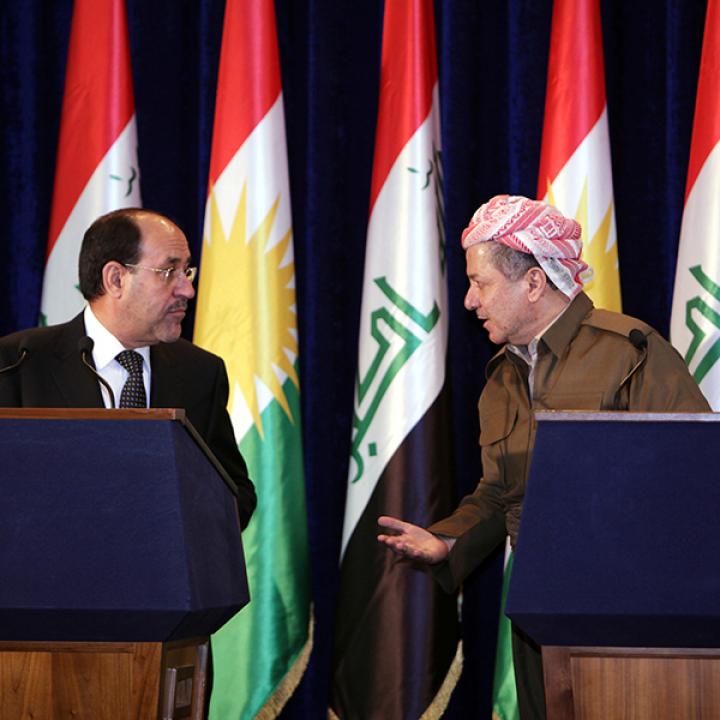

The votes are in, but Baghdad will need to resuscitate the revenue-sharing deal with the Kurds in order to steady the already-troubled government formation process.
On May 19, the Independent High Electoral Commission (IHEC) released the results of Iraq's April 30 national elections, and Shiite prime minister Nouri al-Maliki scored strongly on two fronts. First, his State of Law Alliance held its ground, winning 92 seats in the new 328-seat parliament compared to 89 in the previous 325-seat assembly. Second, he surpassed his personal vote count of 622,000 in 2010 by collecting 727,000 votes this time. Although rival Shiite parties and Kurdish and Sunni Arab oppositionists collectively won around 160 seats -- just shy of the 165 required to ratify a prime minister -- opponents of a third Maliki term would have to set aside their differences and demonstrate near-perfect cohesion to unseat him. Maliki is therefore the front runner for now, though his victory is not a foregone conclusion by any means.
If events favor Maliki, accepting his potential reappointment would be especially difficult for the Iraqi Kurds, who command 62 seats in the new parliament. On May 14, Kurdistan Regional Government (KRG) president Masoud Barzani underlined his opposition in personal terms, stating, "The Maliki that we knew before he was in power was different from the Maliki who has been in power," adding that the longtime prime minister bore chief responsibility for "totalitarianism" in Iraq. According to Rebwar Sayid Gul -- a senior official with the Kurdistan Islamic Union who attended a May 18 gathering with other Kurdish leaders in Erbil -- the Kurdish blocs "have decided that if Maliki is nominated for a third term, [they] will hold a referendum on independence and separation from Iraq." Such a referendum is akin to a doomsday machine that once initiated may not be stoppable; the Kurds are making the threat because they are increasingly desperate, fearing that Maliki's reappointment will be fatal to their ambitions. Yet such a threat may inadvertently reduce their ability to cut deals with Arab blocs in Iraq.
Erbil's opposition has intensified sharply ever since Maliki interrupted Kurdish revenue-sharing transfers from the federal government this year. That move was a response to the Kurds' refusal to market their oil to international buyers using the federal State Oil Marketing Organization and Iraq's New York and Baghdad bank accounts. Whereas the KRG previously received over a billion dollars in monthly transfers, Baghdad has only sent partial payments for two of the five months of 2014. In mid-March, Maliki approved the back-payment of January and February KRG salaries, and the Kurds responded by offering to provide 100,000 barrels per day of oil to Baghdad from April 2014 onward. Yet with both sides playing games to stymie the oil flows, Maliki suspended the payments for March, April, and May, meaning that the KRG has received only $1.3 billion of the $4.25 billion needed to pay its salaries this year. Desperate KRG fundraising activities have gathered a reported $429 million of additional funds, but pay protests are escalating across the Kurdish region.
Indeed, the budget cut has incensed the Kurds more than anything Maliki has previously done. President Barzani has frequently referred to such a cut as "an act of war," and on May 14 he warned that "those who cut the budget of Kurdistan are going to pay the price of that decision."
Regardless of the rights and wrongs of the federal and KRG positions, these are among the worst possible circumstances under which to form a multiethnic, cross-sectarian government. Before the elections, U.S. diplomats foresaw the outcome of the budget clash and energetically sought to prevent it, helping Baghdad and Erbil craft a revenue-sharing and joint oil marketing system that would satisfy their near-term needs. If this agreement is fully set in motion, it could represent one of Iraq's most positive forward steps in half a decade. Currently, the deal is functionally complete, including export infrastructure, marketing arrangements, and near-automatic revenue management that would allow the KRG to pay entitlements to its oil contractors. All the machine needs is a modicum of goodwill on both sides to bring it to life. Iraq's other problems may be equally pressing -- notably the government's increasing use of Shiite militiamen to fight its counterinsurgency -- but the Baghdad-Kurdish issue is an area where the U.S. government can help provide a solution right now.
Resuscitating this deal is more important than ever, and U.S. diplomats should make it an early priority as they seek to build on the elections and foster a stable government that could improve the prospects for stabilizing Iraq. The oil export and revenue-sharing agreement clears the way for Kurdish involvement in the next Iraqi government and is needed whether the next premier is Maliki or somebody else. Political compromises combined with the right oil deal could keep Erbil from toying with independence and allow Iraq's factions to focus on rebuilding the relative unity and tranquility seen before the 2010 elections and the terrorist surge in the west.
Michael Knights is a Boston-based Lafer fellow with The Washington Institute.



